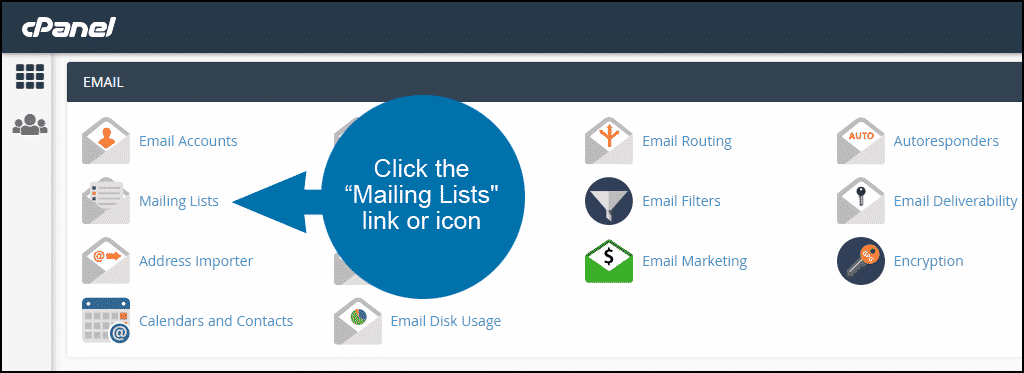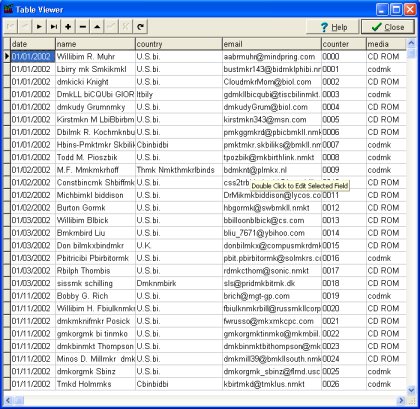Good Ideas On Deciding On An Email List Website
Wiki Article
What Aspects Should I Consider When Purchasing A Hematologist's Email List?
When buying a hematologist's emails list, it's essential to focus on several critical factors to ensure that the list is effective, accurate, legally compliant, and relevant to your marketing goals. Here are the key considerations:1. Data Accuracy and Quality
Source of Data: Ensure that the service provider is using reliable data sources like medical directories, professional directories or opt-ins verified by medical experts. The credibility of a list is determined by how precisely contacts were collected.
Verification and Updates: Request information about the provider's data verification procedure. Verify email addresses to eliminate inactive or incorrect addresses. It is crucial to keep the list frequently, since healthcare professionals may alter their jobs or even institutions.
Specialization and Segmentation: Be sure that your list is specific to hematologists. It could be further segmented, for example by subspecialty (e.g. pediatric hematology, oncology) as well as locations, years of experience, or even hospital affiliation. The segmented lists will assist in targeting your outreach better.
2. Legal Regulations
Data Privacy Laws – Ensure the list complies with relevant laws and regulations, such as California Consumer Privacy Acts within the U.S.A. or General Data Protection Regulations in Europe. That means email addresses can only be taken into account once consent has been granted.
CAN-SPAM Act: In the U.S., ensure the list complies with the CAN-SPAM Act, which governs commercial emails. Infractions can result in penalties and your email may be flagged as spam.
Consent to opt-in This list should contain only hematologists with a clear opt-in to receive emails from third parties. Unsolicited emails sent to individuals with no consent could result in lower engagement and legal problems.
3. Provider Reputation
Verify the credibility of the company. To determine if the business is trustworthy, search for testimonials, reviews as well as case studies. A company with a proven track record is more likely to provide quality data that is in compliance with.
Transparency: Select a service who is open about where and how data came from. It is recommended to stay clear of providers that are unclear or unclear about their collection practices.
Customer Service: It's important to choose a service that has excellent customer support. Support is vital if are having problems with your configuration or technology or need to alter your checklist or have questions regarding compliance.
4. Return on investment (ROI) and cost
Pricing Models: Think about the pricing models offered and consider whether they are pay-percontact, flat rate, or subscription. Check that the price is in line with the ROI potential. Also, you must balance the quality of the list and the amount in relation to the budget for marketing.
Refund or replacement policy A reputable provider will provide refunds or replacements to customers with incorrect or outdated email addresses. Clarify terms of policy before purchasing.
Value for money Comparison of features such as segmentation choices and data accuracy guarantees together with the price. The cheapest list does not guarantee the best value for your money if it's got low quality data.
5. Data ownership and use
Single Use Vs. Multiple Use: Be certain to read the conditions for making use of the email list. Certain providers allow only the use of the list for one particular campaign whereas others provide unlimited use rights.
Exclusive vs. Shared Lists. Find out whether an email list is yours only or is shared with other buyers. Exclusive lists will have a higher rate of engagement since the contacts will be more likely to not receive numerous marketing emails.
6. Data Integration and Format
Integration with CRM or email Tools: Ensure that the email list can easily be connected to your CRM or email marketing platforms. The list should come in common formats such as CSV or Excel to make it easy to integrate.
User-friendliness: Consider how easy it is to sort and manage the list. Lists which are difficult to manage and segment could hinder the effectiveness of campaigns.
7. Ethical Considerations
Relevance to Hematologists Make sure that your outreach emails are pertinent to the field of hematology. Sending content to hematologists which doesn't align with their expertise will cause poor engagement and will affect the reputation of your brand.
Avoid Spam practices - Avoid overwhelming recipients with messages. Sending too many emails too often could result in complaints about spam, which could damage the reputation of your email sender.
Conclusion
It's important to carefully consider the pros and cons of purchasing an hematologist's list. Consider the data accuracy, the provider's reputation, and compliance with privacy legislation to ensure that you receive a quality list. The importance of segmentation, as well as the legal requirements and ethical marketing can help you increase your ROI and keep your brand's name in good standing. Check out the top hematologists email list for website advice.

If You're Looking To Purchase An Oil Industry-Related Email List There Are 10 Important Things To Keep In Mind.
Take note of these points when purchasing an oil and gas email list to ensure that the list you buy is of high quality, targeted and legal. Here are the top 10 points to consider:
1. Relevance for the intended audience
Ensure that the email list only targets the oil and natural gas industry. A well-organized email list must include professionals including engineers, geologists. Operations managers and decision makers from upstream, downstream and midstream operations.
Job Titles and Roles Look for a list that contains the decision-makers who are relevant in your company of choice (executives/managers/engineers and so on.). within the companies you wish to be targeting.
2. List Source and Vendor Reputation
Reputable suppliers: Only purchase from trusted and reputable email list providers that adhere to the most effective practices for collecting data. Beware of sources that have a questionable source since they can lead to poor-quality data or even legal problems.
Data Quality: Conduct research or request testimonials in order to evaluate the data provider's quality.
3. Data Accuracy and Freshness
Contact information must be up-to-date. The staff of companies that deal in oil and gas is continuously shifting, which can result in outdated contact information.
Verification Process. Check that vendors regularly verify and amend their lists to get rid of inaccurate or non-responsive contact information.
4. Compliance with Regulations
Legal Compliance - Check that the list conforms to the laws of both countries that govern personal data, such as GDPR, CANSPAM etc. These laws govern the processing and storage of personal data. Non-compliance may lead to penalties as well as legal risks.
Opt-In Process: Check whether the email addresses listed in the list were acquired by consent. That is, they had opted to receive communications.
5. Segmentation, Customization and Configuration
Custom Segmentation: Quality list providers should have options for segmentation based on things like location, job title, business size, or sub-sectors in oil and gas.
Custom Filters: Based on your campaign objectives you can customize the list according to the criteria you want to meet, such as geographical area, business size or particular requirements.
6. Rate of Deliverability
High Deliverability Rates A high-quality list of email addresses should have excellent rates of deliverability (normally 95 percent). The lists that aren't of the highest quality usually contain high bounce rates which can harm your sender image and marketing efforts via email.
Request previous data or statistics on deliverability to determine the success of the list.
7. Volume Vs.
Quality over Quantity: Ensure the list isn't simply large in volume but also extremely targeted and precise. A shorter list with high quality could yield more results than a lengthy, generic one.
Engagement Metrics Prioritize engagement metrics over contacts. A person who is engaged is more likely to respond.
8. Cost Structure and Pricing
Transparent Pricing: Understand the pricing structure of the list, whether it's a once-off purchase or subscription-based. Be cautious about lists that appear very inexpensive. They might not have any quality or offer value.
Return on investment (ROI). Check the list price with the anticipated conversion rates to get an idea of the ROI. It's sometimes cheaper to pay a higher price for a list that has a high conversion rate.
9. Privacy of data and security
Data Protection: Make sure that the vendor uses strong data security measures. The list provider should guarantee that all personal information is secured from access by unauthorized persons.
Confidentiality. Make sure that the service is not going to sell or share your information. Especially if your company requires discretion and confidentially.
10. Customer Service and Support after-sales
Support on a regular basis: The vendor should offer support to customers should you encounter problems with the list or require assistance with implementation.
List Replacement Guarantee: In the event that there's any problems in the list (e.g. incorrect data or delivery issues), a good supplier will refund or replace it.
Take note of these points to make sure you're purchasing the right oil and gas list of email addresses that is effective, compliant and geared to your company's goals. See the top oil and gas industry email list for site guide.
